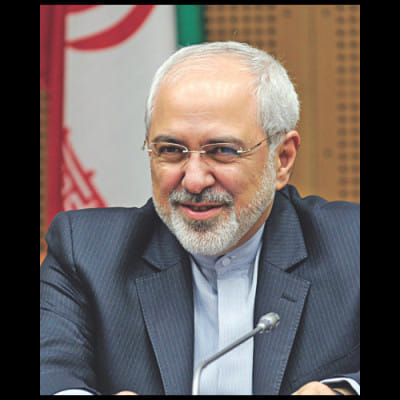Visiting Iran FM sees mutual gain through trade

Ending his daylong visit yesterday, Iranian Foreign Minister Mohammad Javad Zarif outlined ways and means for mutual economic gains through wider collaboration in areas, including energy and trade.
Bangladesh's president and prime minister also expressed optimism that implementation of July's nuclear agreement would contribute to peace, stability and peoples' wellbeing; bring dynamism into the Iran's economy and create new opportunities for trade and investment for Bangladesh, said a Bangladesh foreign ministry press release.
The deal between Iran and the superpowers, the E3/EU+3 (China, France, Germany, the Russian Federation, the United Kingdom, the United States of America and the European Union), was also on lifting international sanctions on Iran.
Addressing a press conference in the capital's Pan Pacific Sonargaon Hotel, Zarif explained the reason for his visit, saying Iran considered Bangladesh extremely important as the latter stood for it in international forums. "Bangladesh supported us in the course of our struggle," he added. Javad Zarif said the two countries were discussing inking deals, including for avoiding double taxation and customs cooperation, for easing visas for officials and for cooperation in the energy sector once the sanctions were lifted. "These are the areas that will help boost trade between the two countries apart from forming joint chambers and business teams," he added.
Bangladesh's finance minister will be visiting Iran soon for joint economic commission meetings and the state minister for energy for discussions on getting energy from Iran.
"Iran is a reliable source of energy, particularly for a friendly country…We are seeking and exploring possibilities in energy cooperation," said Javad Zarif, adding that previously, financial sanctions had made this impossible.
He said they were expecting a date at November's end or in December to see the stage set for the lifting of the sanctions "if everything goes according to plan".
"We believe that the timeframe of lifting the sanctions will depend on a number of steps needed to be taken by both sides," he said.
Javad Zarif said the joint economic commission would open possibilities, including for visits by business communities.
He also talked about cooperation in combating extremism, which needs to be explored through appropriate mechanisms. Iranian Ambassador in Dhaka Abbas Vaezi was also present.
Bangladesh's optimism over the nuclear deal was expressed when Javad Zarif separately called on President Abdul Hamid and Prime Minister Sheikh Hasina and briefed them on aspects of the deal, particularly the future course of action.
He also had a bilateral meeting with Bangladesh Foreign Minister AH Mahmood Ali and sought Bangladesh's support in implementation of the agreement.
The discussion focused on visits by private and public sectors and identified trade and investment, energy, science & technology, culture & education, shipbuilding, blue economy and tourism as the potential sectors for cooperation.

 For all latest news, follow The Daily Star's Google News channel.
For all latest news, follow The Daily Star's Google News channel. 



Comments